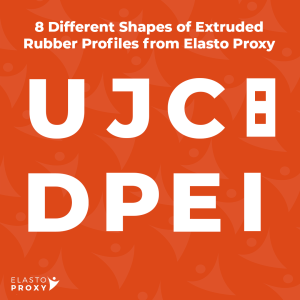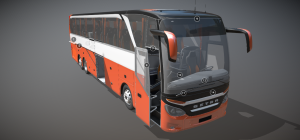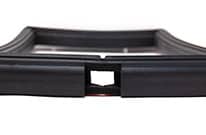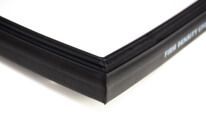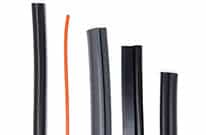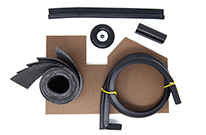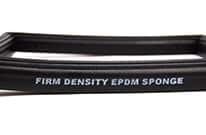Railcar Products for Passenger Trains: Custom Seals, Gaskets, and Insulation
 Railcar products for passenger trains include custom seals, gaskets, and insulation for vehicle interiors and exteriors. Railcar interiors require specialized rubber products that meet flame, smoke, and toxicity (FST) standards. Railcar exteriors need reliable sealing and insulation solutions that can withstand tough environmental conditions while protecting passenger health and safety.
Railcar products for passenger trains include custom seals, gaskets, and insulation for vehicle interiors and exteriors. Railcar interiors require specialized rubber products that meet flame, smoke, and toxicity (FST) standards. Railcar exteriors need reliable sealing and insulation solutions that can withstand tough environmental conditions while protecting passenger health and safety.
For railcar designers and sourcing managers, finding the right rubber products can be challenging. Because FST standards vary, engineers may need a supplier who can help with compound selection. Procurement personnel may need a vendor who can meet tight delivery timetables, especially with mass transit repairs. Cost-effective production is important, but designers and buyers also want value-added manufacturing. (more…)

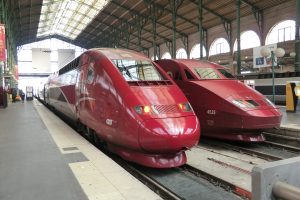 Railcar rubber products need to meet flame smoke, and toxicity (FST) standards that protect human health and safety. Fires that burn railcar seats, floors, wall panels, and other interior components don’t just cause immediate injuries and fatalities. Flames can release smoke that obscures escape routes. Burning rubber that releases toxic gases can also overwhelm passengers and employees.
Railcar rubber products need to meet flame smoke, and toxicity (FST) standards that protect human health and safety. Fires that burn railcar seats, floors, wall panels, and other interior components don’t just cause immediate injuries and fatalities. Flames can release smoke that obscures escape routes. Burning rubber that releases toxic gases can also overwhelm passengers and employees. Mass transit maintenance organizations need to make cost-effective repairs to buses and trains. Public transit authorities and maintenance, repair and overhaul (MRO) companies also want to source replacement parts in low-to-medium volume quantities. Original equipment manufacturers (OEMs) can supply these custom rubber products, but usually at higher prices than sourcing managers want to pay. The minimum order quantities (MOQs) may be more than maintenance crews need, too.
Mass transit maintenance organizations need to make cost-effective repairs to buses and trains. Public transit authorities and maintenance, repair and overhaul (MRO) companies also want to source replacement parts in low-to-medium volume quantities. Original equipment manufacturers (OEMs) can supply these custom rubber products, but usually at higher prices than sourcing managers want to pay. The minimum order quantities (MOQs) may be more than maintenance crews need, too.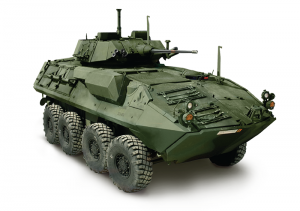 Thermal-acoustic insulation for military land systems absorbs heat and sound. These composite structures are used in engine compartments, doors, floors, side panels, and hatch covers. Elasto Proxy custom-fabricates thermal-acoustic insulation from foams, films, facings, and other specialized materials that meet your requirements. Our capabilities include water jet cutting for precise cuts, lamination for the reliable joining of different materials, and taping for thermal-acoustic insulation that’s easy-to-install.
Thermal-acoustic insulation for military land systems absorbs heat and sound. These composite structures are used in engine compartments, doors, floors, side panels, and hatch covers. Elasto Proxy custom-fabricates thermal-acoustic insulation from foams, films, facings, and other specialized materials that meet your requirements. Our capabilities include water jet cutting for precise cuts, lamination for the reliable joining of different materials, and taping for thermal-acoustic insulation that’s easy-to-install.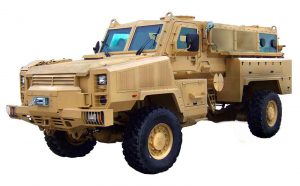 Engine bay insulation for military vehicles keeps noise and heat in the engine bay from reaching the passenger compartment. The diesel engines that power military land systems run loud and hot, raising concerns about solider health and safety. Warfighters need to be able to hear each other above engine sounds, and a vehicle where the air conditioning runs full-blast is less fuel-efficient. Hotter vehicles also have stronger heat signatures, making them more susceptible to thermal detection by hostile forces.
Engine bay insulation for military vehicles keeps noise and heat in the engine bay from reaching the passenger compartment. The diesel engines that power military land systems run loud and hot, raising concerns about solider health and safety. Warfighters need to be able to hear each other above engine sounds, and a vehicle where the air conditioning runs full-blast is less fuel-efficient. Hotter vehicles also have stronger heat signatures, making them more susceptible to thermal detection by hostile forces. Rubber gaskets for mobile equipment provide sealing and insulation for doors and windows. They prevent the entry of outside air and water, but also absorb road and engine noise. For mobile equipment manufacturers, the right rubber gaskets need to provide both environmental sealing and acoustic insulation. Otherwise, unwanted sounds can enter the cab where the operator sits. Seals that admit wind, water, dirt, or outdoor temperatures are problematic, but so is
Rubber gaskets for mobile equipment provide sealing and insulation for doors and windows. They prevent the entry of outside air and water, but also absorb road and engine noise. For mobile equipment manufacturers, the right rubber gaskets need to provide both environmental sealing and acoustic insulation. Otherwise, unwanted sounds can enter the cab where the operator sits. Seals that admit wind, water, dirt, or outdoor temperatures are problematic, but so is 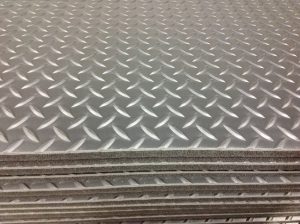 Rubber floor mats for mobile equipment protect the cabin floor, support employee safety, and provide acoustic insulation. The metal flooring that’s used inside the cab is strong and durable, but operators track mud, snow, dirt, and water inside. Rubber floor mats protect these metal surfaces and help reduce slip-and-fall hazards. Rubber flooring that’s laminated to acoustic insulation also helps to absorb noise from the engine compartment, which is often directly below the cab where the operator sits.
Rubber floor mats for mobile equipment protect the cabin floor, support employee safety, and provide acoustic insulation. The metal flooring that’s used inside the cab is strong and durable, but operators track mud, snow, dirt, and water inside. Rubber floor mats protect these metal surfaces and help reduce slip-and-fall hazards. Rubber flooring that’s laminated to acoustic insulation also helps to absorb noise from the engine compartment, which is often directly below the cab where the operator sits.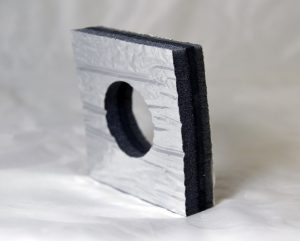 Engine bay insulation for mobile equipment keeps heat and noise in the engine compartment from reaching the cab interior. The diesel engines that power mobile equipment run hot and loud, which raises concerns about occupant comfort, health, and safety. Mobile equipment manufacturers also need to protect cabin components such as instruments from sound-induced vibrations. For a complete engine bay solution, Elasto Proxy makes thermal-acoustic insulation that can also dampen vibrations.
Engine bay insulation for mobile equipment keeps heat and noise in the engine compartment from reaching the cab interior. The diesel engines that power mobile equipment run hot and loud, which raises concerns about occupant comfort, health, and safety. Mobile equipment manufacturers also need to protect cabin components such as instruments from sound-induced vibrations. For a complete engine bay solution, Elasto Proxy makes thermal-acoustic insulation that can also dampen vibrations.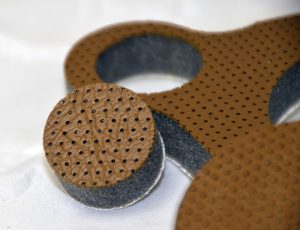 Custom cabin insulation for mobile equipment absorbs sound and provides a finished appearance to cabin interiors. Headliners, door panels, and side panels are made of perforated vinyl foams that, depending on the amount of cabin noise, are typically 1/2” or 1” thick. This acoustic insulation can be hand-cut and applied with spray adhesives, but that process is labor-intensive, results in material waste, and raises health and safety concerns. Fortunately, there’s a better way to get the cab insulation that you need.
Custom cabin insulation for mobile equipment absorbs sound and provides a finished appearance to cabin interiors. Headliners, door panels, and side panels are made of perforated vinyl foams that, depending on the amount of cabin noise, are typically 1/2” or 1” thick. This acoustic insulation can be hand-cut and applied with spray adhesives, but that process is labor-intensive, results in material waste, and raises health and safety concerns. Fortunately, there’s a better way to get the cab insulation that you need.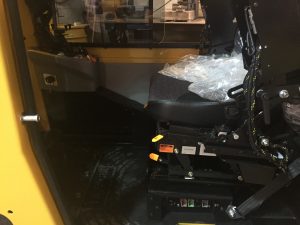 Mobile equipment insulation absorbs sound and deflects heat, helping to keep drivers and operators safe and comfortable. Materials of construction vary, but generally include foams, foils, and facings. For mobile equipment manufacturers, the process of cutting, assembling, and installing thermal insulation and acoustic insulation can result in material waste and concerns about product quality. Manufacturers risk losing sight of their true costs, and potential buyers may notice imperfections in cab and vehicle interiors.
Mobile equipment insulation absorbs sound and deflects heat, helping to keep drivers and operators safe and comfortable. Materials of construction vary, but generally include foams, foils, and facings. For mobile equipment manufacturers, the process of cutting, assembling, and installing thermal insulation and acoustic insulation can result in material waste and concerns about product quality. Manufacturers risk losing sight of their true costs, and potential buyers may notice imperfections in cab and vehicle interiors.